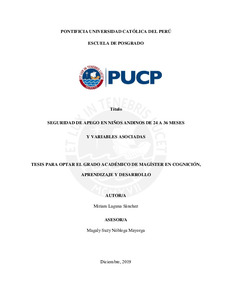| dc.contributor.advisor | Nóblega Mayorga, Magaly Suzy | |
| dc.contributor.author | Laguna Sánchez, Miriam | |
| dc.date.accessioned | 2021-09-10T21:52:12Z | |
| dc.date.available | 2021-09-10T21:52:12Z | |
| dc.date.created | 2019 | |
| dc.date.issued | 2021-09-10 | |
| dc.identifier.uri | http://hdl.handle.net/20.500.12404/20320 | |
| dc.description.abstract | Este estudio busca describir las características del apego en niños y niñas de una zona andina de
Ayacucho en el Perú. El estudio de la primera infancia comprende aspectos fundamentales del
desarrollo como el apego, siendo clave considerar las variables sociocontextuales que pueden
influenciar directa o indirectamente en su expresión, principalmente en realidades diversas como
la peruana. Se observaron, en sus hogares, a 34 diadas madre-niño en una zona andina de Ayacucho - Perú. Los niños tenían entre 24 a 36 meses y las madres entre 18 y 40 años, y más de la
mitad de ellas tenía primera completa o menos (68%). Se utilizó el Attachment AQS que permite
la observación en ambientes naturales, para obtener información a tres niveles: hallando que los
niños tienen un índice de apego con tendencia a la seguridad; la dimensión de placer del contacto
con la madre es la más cercana al promedio teórico ideal; y que los niños tienen una buena disposición hacia su cuidador y otros adultos, ubicando a su madre como base de seguridad desde la
cual exploran activamente su entorno. No se encontró asociación entre la seguridad de apego y
variables consideradas de riesgo económico, pero si con dos variables de riesgo emocional. Incluso con las limitaciones económicas de comunidades en pobreza extrema, este contexto andino
estaría proveyendo factores que protegen el vínculo madre-niño. Es importante ampliar el estudio de las variables asociadas al apego desde un abordaje integral y sociocultural, para conocer y
atender oportunamente a la infancia en un contexto diverso como el Perú. | es_ES |
| dc.description.abstract | This study aims to describe the characteristics of attachment in girls and boys of an Andean area
of Ayacucho in Peru. The study of the early childhood comprises fundamental aspects of development such as the attachment. It is crucial to consider the socio-contextual variables that might
influence direct or indirectly in its expression, mainly in diverse realities like the Peruvian ones.
In an Andean area of Ayacucho - Peru, 34 mother-child dyads were observed at their homes. The
children were between 24 to 36 months old and their mothers were between 18 to 40 years old.
More than half of them completed 68% or all of primary school. For the natural environment
observation, the AQS attachment was used; in order to obtain information in three levels: children have an attachment rate with a tendency to security; the dimension of pleasure from making
contact with the mother is the closest to the theoretical ideal average; and children have a good
disposition towards their caregivers and other adults, placing their mothers as a security base
from where they actively explore their surroundings. No association was found between the security of attachment and variables of economic risk, but yet association with two emotional risks
variables.
Even with the economic constraints of communities in extreme poverty, this Andean context
would be providing factors that protect the mother-child bonding. It is important to expand the
study of the variables associated with the attachment from an integral and socio-cultural approach in order to know and respond in a timely manner to the infancy in a diverse context in
Peru. | es_ES |
| dc.language.iso | spa | es_ES |
| dc.publisher | Pontificia Universidad Católica del Perú | es_ES |
| dc.rights | info:eu-repo/semantics/openAccess | es_ES |
| dc.rights.uri | http://creativecommons.org/licenses/by-nc-sa/2.5/pe/ | * |
| dc.subject | Apego | es_ES |
| dc.subject | Desarrollo infantil--Aspectos sociales--Perú--Ayacucho | es_ES |
| dc.subject | Madres e hijos--Aspectos psicológicos--Perú--Ayacucho | es_ES |
| dc.title | Seguridad de apego en niños andinos de 24 a 36 meses y variables asociadas | es_ES |
| dc.type | info:eu-repo/semantics/masterThesis | es_ES |
| thesis.degree.name | Magíster en Cognición, Aprendizaje y Desarrollo | es_ES |
| thesis.degree.level | Maestría | es_ES |
| thesis.degree.grantor | Pontificia Universidad Católica del Perú. Escuela de Posgrado | es_ES |
| thesis.degree.discipline | Cognición, Aprendizaje y Desarrollo | es_ES |
| renati.advisor.dni | 09823932 | |
| renati.advisor.orcid | https://orcid.org/0000-0001-6572-813X | es_ES |
| renati.author.dni | 10734067 | |
| renati.discipline | 199237 | es_ES |
| renati.juror | Pain Lecaros, Oscar Andrés | |
| renati.juror | Nóblega Mayorga, Magaly Suzy | |
| renati.juror | Claux Alfaro, Mary Louise | |
| renati.level | https://purl.org/pe-repo/renati/level#maestro | es_ES |
| renati.type | http://purl.org/pe-repo/renati/type#tesis | es_ES |
| dc.publisher.country | PE | es_ES |
| dc.subject.ocde | http://purl.org/pe-repo/ocde/ford#5.01.00 | es_ES |






